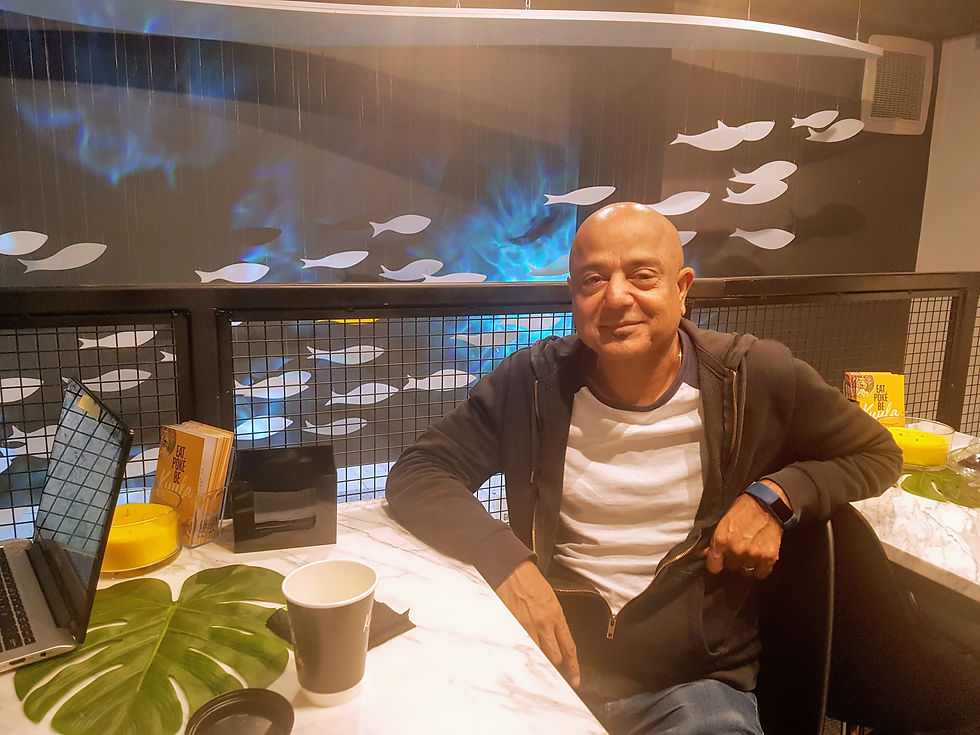
Of all the venues getting involved in this collaboration between Overhear and Birmingham Literature Festival, Kuula Poké is the newest, having opened just this year. Interesting, then, that the writer who chose it as his venue also used the opportunity to try something new: poké – and poetry. We met up with Ashok Patel in Kuula Poké to talk about experimentation, discovery and the journeys we take to make them.
‘I try to take every opportunity I can write.’ Ashok tells us, ‘I’m really aware that making time for writing is difficult so deadlines help, new challenges, interesting new opportunities help. I got an email from Tom and then a long chat on the phone where he explained the project to me – I didn’t get it straight away but I was intrigued – and now I understand better what it’s all about.’
Ashok followed the same instinct of curiosity when choosing his Overhear venue: ‘There were a number of venues that were available and I quickly looked them up – as you do – and I saw this Hawaiian Poké eatery and I thought what is that? What is that? And then I thought okay, that’ll do me.’ He smiles. ‘Since then, of course, I’ve discovered more about the food, the restaurant and about Felicity – who owns the place – and who has a really interesting journey.’

‘Poké is originally a dish of thinly sliced fish with soy sauce and sesame oil and things,’ Ashok tells us, ‘but it’s evolved into many other variations. Felicity first had a poké dish in Venice Beach and she sort of fell in love with it there, then she went to Hawaii to learn more about it and saw the variety, what the dish had evolved into. She decided she had to bring it back with her to Birmingham and two years later, here we are. That story, those images really fixed in my mind, so that’s what I wrote about.’
Ashok’s piece, it turns out, has also been on a journey of development, as he informs us: ‘At first I thought I knew exactly what I was doing. I had it completed – a short story – but when I read it back it felt like an article for a newspaper.’ He shakes his head, ‘Really, if you’re sitting here and you’re listening to the piece on the app, do you really want to hear a restaurant critique or do you want to hear a story with some kind of energy, emotion, interest?’
‘It was a challenge for me but that was when I started to see it as a piece of poetry rather than prose, it felt like that was the way to go; it was what the project lent itself to.’ Still not the easiest of choices, as Ashok goes on to explain.
‘I’ve never really written poetry before,’ he admits, ‘it’s just not been a big part of the journey my writing has taken. I began writing for theatre – playwriting – and then, in the last three years or so, short stories. It could all go terribly wrong!’ He laughs. ‘But I’m convinced that this is the way to do this piece.’
In fact, Ashok cites the nature of the Overhear itself as an incentive to experiment with his writing. ‘This might be the perfect project to try something new with. I think because the brief was left so broad, it allows for that experimentation. If in our first conversation Tom had said he wanted me to write a poem I’d have said no, that’s not what I do. But he didn’t. And that is what I’m doing.’
Form is not the only unexpected turn of events for Ashok’s piece, he goes on to tell us.
‘Writing this has made me think of other things too. As I’ve said, poké is originally a very healthy fish dish and the other half of the restaurant name – Kuula – refers to a Hawaiian god of fishing. That made me think about the fact that there aren’t plenty more fish in the sea, as it were – there just aren’t. I couldn’t stop thinking about how we’re systematically destroying this planet (although to be fair, I worry a lot about that anyway) and about how we get on with each other as we go on, that feeling that we’re getting more fragmented. Those ideas crept into there as well – which is not where I thought I’d do with a piece about this eatery.’ He pauses. ‘But with a project like this, focussed on place… place is like that. It can be evocative. It can inspire you; you can connect to it in ways you wouldn’t have thought.’

On the subject of discovering new ways to connect to place, Ashok talks to us about his view of the Overhear walking tours: ‘Many years ago I lived in London,’ he says, ‘and one of the places I loved going to while there was the National Portrait Gallery. That place is huge; you simply cannot grasp what’s in there if you just run around it one afternoon.’
‘I used to go there often, and they had these for-hire headphones with little machines. You put in the number of the painting you were looking at and it would give you all this extra information you wouldn’t have gotten otherwise,’ he tells us, ‘It really enriched your understanding. I’m thinking of this app – and the walking tours – along the same lines. They give you something extra… but not just information but emotions and connections through the pieces. It feels like a natural evolution, to get more out of walking around this city, these venues.’
To see how you can enrich your experience of the city and one Hawaiian eatery in particular, Ashok’s poem from Kuula Poké using the Overhear app. bit.ly/OverhearApp

Commentaires